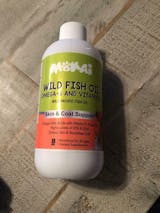Superfoods have become a worldwide trend over the last decades. The name speaks for itself: A SUPER food (unless you are thinking of veggie with a cape). Among the leading ones, we can find spirulina. And since we are always thinking of ways to boost the lives of our four-legged friends, the obvious question arises one more time. Spirulina for dogs: yes or no?
Benefits of spirulina for dogs
Spirulina is a type of blue-green algae we can find in the sea. It is rich in vitamins and proteins and has antioxidant and anti-inflammatory properties that help boost the immune system of our furry friends. Here are 7 clear benefits of spirulina for dogs:
-
Improves gut health: Due to its high fiber content, spirulina is a great supplement for your dog’s gut health and bowel function. Besides, it has been scientifically proven that spirulina increases fecal immunoglobulin A (the major immunoglobulin isotype in the intestinal mucosa) in dogs after 9 weeks of consuming it.
-
Strengthens the immune system: The immune system is in charge of everything else, so, if dogs don’t have a strong immune system, chances are they will get sick, one way or another. Spirulina enhances their bodies’ ability to create new blood cells, while containing phytonutrients, which have many anti-inflammatory and antioxidant properties. Last but not least, it gives a boost to the metabolism, which translates into more energy.
-
Boosts overall skin and coat health: The high content of fatty acids in spirulina helps dogs maintain healthy, young, and moisturized skin. It also gives the coat a silky sheen.
-
Increases wound healing speed: Given that its aqueous extract has shown high wound healing activity, spirulina is considered a potential therapy for chronic wounds.
-
Reduces blood pressure: Spirulina not only helps stabilize blood pressure but also lowers blood sugar and improves blood lipids levels. Win, win, win.
-
Helps heart health: Since spirulina is full of antioxidants, it helps fight allergies, cancer, and heart health. The antioxidants protect dogs from free radical cells, which are the cause of different diseases.
-
Eliminates body toxins and helps kidney disease: It is also used for detoxification and cleansing of the kidneys.
Mokai’s new Daily Multifunctional chews contain ashwagandha and reishi (which you can read about on our blog of Ashwagandha for dogs), and superfoods like spirulina and wheatgrass, which along with fiber and probiotics, constitute the ultimate immune system booster for dogs. On top of that, it contains omega-3 fatty acids that are essential for healthy skin and coat and MSM and Glucosamine that supports long-term joint health.
Is spirulina good for dogs?
The good thing about spirulina is that, in the right dose, dogs can have it every day. However, you should always pay special attention to where spirulina comes from. There are many imitation products of spirulina, that might contain heavy metals (coming from contaminated water), and microcystins (a group of amino acids that attack the liver, and cause eye and throat irritation).
How much spirulina can I give my dog?
The recommended amount for you to start adding spirulina to your dog’s diet is 1/8 teaspoon for every 10 pounds of body weight.
Other superfoods for dogs

Superfoods are defined as nutrient-rich (antioxidants, fiber, or fatty acids) food considered to be especially beneficial for health and well-being. Aside from spirulina, the list of superfoods includes:
- Berries
- Coconut oil
- Broccoli
- Turmeric
- Wheatgrass
- Kale
- Spinach
- Avocado
These superfoods have one thing in common: they are full of nutrients and they are great for our health. However, all fruits, veggies, legumes, and good fats provide countless health benefits. So, never restrict your diet or your dog’s diet to superfoods! Rainbow eating is the best way to make sure you are doing it right.
















